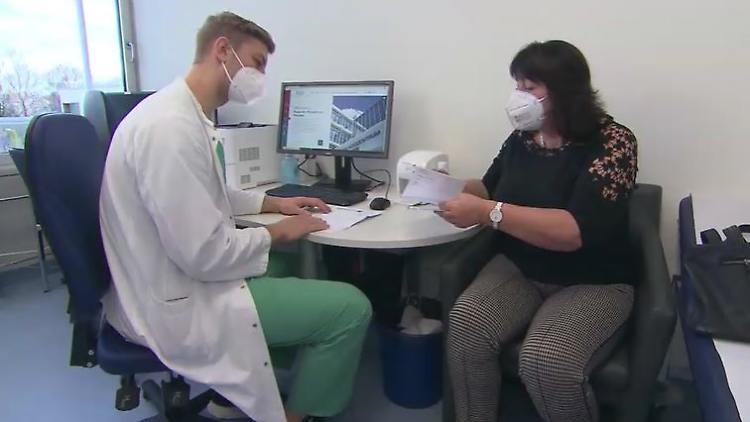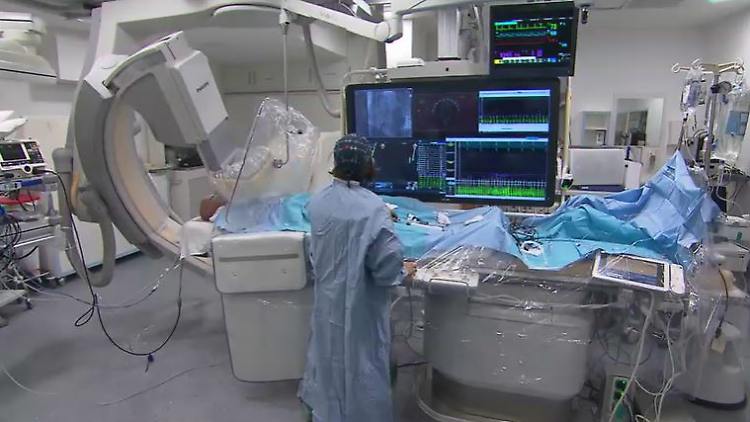Better treatment results
How AI is already revolutionizing medicine
How AI is already revolutionizing medicine
By Daniela Halm
04/23/2022, 11:05
Treating cardiac arrhythmias specifically, reliably diagnosing breast cancer – doctors are able to do this better and better because they are supported by artificial intelligence (AI). “Smart” software can show the doctor exactly where he needs to destroy heart muscle tissue or which areas of the mammogram might be noticeable. AI in medicine is gaining momentum in Germany, and that has benefits for patients.
Anita Gruber from Bavaria had her first cardiac arrhythmia at the age of 20, and after other illnesses the symptoms worsened. Finally, her heart fibrillated nonstop for four months. The 60-year-old recalls a very painful moment: “It was no longer possible to walk normally,” says Anita Gruber, “I just lay down and slept. Nothing worked anymore.” Treatment at the German Heart Center in Munich finally helped. Today she feels reborn. Anita Gruber’s heart is beating regularly again and the AI has helped with that too.
Atrial fibrillation is the most common cardiac arrhythmia, affecting 800,000 people in Germany alone. Typical symptoms are tachycardia and shortness of breath, and severely affected patients are also at significantly increased risk of stroke. Irregular heartbeat can often be regulated with medication. But when that’s not enough, heart muscle tissue must be destroyed for the overactive heart to return to normal.
And this is where AI comes into play. It is a useful tool and can improve treatment outcomes, believes Professor Isabel Deisenhofer, head of the Department of Electrophysiology at the German Heart Center in Munich. Because atrial fibrillation is nothing more than a kind of chaos in the heart, and “this software is there to solve this chaos,” says Deisenhofer.
Software detects cardiac arrhythmias in real time
Doctors can stop fibrillation with a special catheter inserted into the heart. They destroy areas of heart tissue that are too active. But sometimes it’s hard to tell exactly what they are, especially in patients with long-standing atrial fibrillation. The success of the procedure depends a lot on the experience and intuition of the doctors, in about 50 percent of the cases it is necessary to repeat the treatment. With the help of AI, on the other hand, it can be measured in real time where exactly arrhythmias are triggered in the heart and which areas keep atrial fibrillation going. There, doctors can desolate specifically.
The method is still being tested in Munich as part of a clinical study, but Deisenhofer is confident that AI has potential in treating cardiac arrhythmias. “These computers help us improve,” says the doctor. They are tools like a needle or a scalpel. However, the software makes it possible to treat patients who could not otherwise be treated.
Artificial intelligence also plays a role in breast cancer diagnosis. For a year now, Thilo Töllner, as chief physician, has been using special software at Dr. Hancken’s breast center in Stade. As part of mammography, he and his team review about 25,000 images of the female breast each year. “You have to train and practice for a long time before you detect any anomaly,” says Töllner. “We have about six carcinomas in 1000 mammogram screenings. That means I have to keep my attention constantly high. I have to look at each image carefully and carefully and I must not get tired.”
“AI can compensate for human weaknesses”
Each mammogram is reviewed by two radiologists. To make the diagnosis even more reliable, the AI also looks for abnormalities in the background without influencing the doctor. The software only responds when the radiologist assesses a finding as correct, but the AI has come to a different conclusion. Then a visible point is checked again.
According to Töllner, AI is not always better, a radiologist has a lot of experience and sometimes also a gut feeling that something is wrong. However, the AI has a great advantage. “The AI can compensate for human weaknesses, which means it doesn’t get tired, it doesn’t mind monotony, all that stuff. It always works at the same level,” says Töllner. He doesn’t think smart software will replace doctors, but it could speed up work significantly. The more data an AI has, the better it can become. For this it is important to feed the AI with high-quality data.
Back at the German Heart Center in Munich. Patient Anita Gruber’s heart is beating again after treatment and she is delighted: “I was able to carry a laundry basket up to the second floor again, I was able to ride a bike again, I was able to walk again, I was able to have a life again . Amazing”. says the sixty-year-old happily. And Deisenhofer is also pleased to have a “new instrument” available for the treatment of serious cardiac arrhythmias. AI will not replace doctors, but it can provide useful support in some areas.

Introvert. Beer guru. Communicator. Travel fanatic. Web advocate. Certified alcohol geek. Tv buff. Subtly charming internet aficionado.


